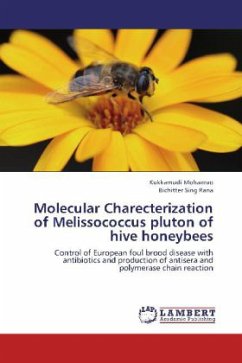- Gebundenes Buch
- Merkliste
- Auf die Merkliste
- Bewerten Bewerten
- Teilen
- Produkt teilen
- Produkterinnerung
- Produkterinnerung
The journey towards morality in nature can be seen through the million-year-old relationship of the flowering plant and honeybee social group. Flowers and Honeybees brings what science has learned into a dialog with the philosophy of morality.
Andere Kunden interessierten sich auch für
![Chloris (1877) Chloris (1877)]() William SmithChloris (1877)27,99 €
William SmithChloris (1877)27,99 €![Molecular Charecterization of Melissococcus pluton of hive honeybees Molecular Charecterization of Melissococcus pluton of hive honeybees]() Kukkamudi MohanraoMolecular Charecterization of Melissococcus pluton of hive honeybees38,99 €
Kukkamudi MohanraoMolecular Charecterization of Melissococcus pluton of hive honeybees38,99 €![Vielfalt achten Vielfalt achten]() Andreas HetzelVielfalt achten32,00 €
Andreas HetzelVielfalt achten32,00 €![The Ambiguity of Justice: New Perspectives on Paul Ricoeur's Approach to Justice The Ambiguity of Justice: New Perspectives on Paul Ricoeur's Approach to Justice]() The Ambiguity of Justice: New Perspectives on Paul Ricoeur's Approach to Justice207,99 €
The Ambiguity of Justice: New Perspectives on Paul Ricoeur's Approach to Justice207,99 €![Thinking, Knowing, Acting: Epistemology and Ethics in Plato and Ancient Platonism Thinking, Knowing, Acting: Epistemology and Ethics in Plato and Ancient Platonism]() Thinking, Knowing, Acting: Epistemology and Ethics in Plato and Ancient Platonism227,99 €
Thinking, Knowing, Acting: Epistemology and Ethics in Plato and Ancient Platonism227,99 €![An Ethical Modernity? An Ethical Modernity?]() An Ethical Modernity?182,99 €
An Ethical Modernity?182,99 €![The Eudaimonist Ethics of Al-Fārābī And Avicenna The Eudaimonist Ethics of Al-Fārābī And Avicenna]() Janne MattilaThe Eudaimonist Ethics of Al-Fārābī And Avicenna136,99 €
Janne MattilaThe Eudaimonist Ethics of Al-Fārābī And Avicenna136,99 €-
-
-
The journey towards morality in nature can be seen through the million-year-old relationship of the flowering plant and honeybee social group. Flowers and Honeybees brings what science has learned into a dialog with the philosophy of morality.
Hinweis: Dieser Artikel kann nur an eine deutsche Lieferadresse ausgeliefert werden.
Hinweis: Dieser Artikel kann nur an eine deutsche Lieferadresse ausgeliefert werden.
Produktdetails
- Produktdetails
- Verlag: Brill
- Seitenzahl: 244
- Erscheinungstermin: 23. Mai 2020
- Englisch
- Abmessung: 236mm x 152mm x 20mm
- Gewicht: 476g
- ISBN-13: 9789004428539
- ISBN-10: 9004428534
- Artikelnr.: 58816523
- Herstellerkennzeichnung
- Produktsicherheitsverantwortliche/r
- Europaallee 1
- 36244 Bad Hersfeld
- gpsr@libri.de
- Verlag: Brill
- Seitenzahl: 244
- Erscheinungstermin: 23. Mai 2020
- Englisch
- Abmessung: 236mm x 152mm x 20mm
- Gewicht: 476g
- ISBN-13: 9789004428539
- ISBN-10: 9004428534
- Artikelnr.: 58816523
- Herstellerkennzeichnung
- Produktsicherheitsverantwortliche/r
- Europaallee 1
- 36244 Bad Hersfeld
- gpsr@libri.de
Christopher Ketcham, Ph.D., is retired from the University of Houston Downtown where he taught risk management and ethics. Chris has published in The Journal of Animal Ethics, Space Policy Journal, Marcel Studies, Philosophical Inquiries, and Journal of the Philosophy of Life.
Acknowledgements
Preface: Introducing the Meadow
Introduction
1 The Question This Study Explores
2 The Shape of This Study
Cited References
1 Optimization, MEP, and Mutualism
1 Introduction
2 Optimization
3 Maximum Entropy Production (MEP)
4 Mutualism
Cited References
2 Emergence of the Flower and Honeybee Mutualism and Flower and Honeybee Ontology and Morphology
1 Introduction
2 Evolution of the Flower Honeybee Mutualism
3 Emergence
4 Angiosperm Morphology
5 Flower Morphology
6 Honeybee Eusociality and Morphology
7 The Moral Honeybee
Cited References
3 Flower and Honeybee Epistemology and Behavior
1 Introduction
2 Angiosperm Epistemology and Behavior
3 Plant Intelligence-a Philosophical Discussion
4 Honeybee Epistemology and Behavior
5 Consciousness in Flowers and Honeybees
6 Moral Elegance
Cited References
4 Epigenetics
1 Epigenetics Defined
2 Promise of Epigenetics
3 Epigenetic Purposes
4 General Implications of Epigenetics
5 Implications of Epigenetics for Flowers and Honeybees
Cited References
5 The Good and the Emergence of Morality in the Flower and Honeybee Mutualism
1 Introduction
2 Asymmetricity
3 Responsibility
4 Reciprocal Responsibility
5 Up from Value
6 Hospitality
7 Pragmatic Naturalism
8 Altruism
9 Singer's Requirements for Morality to Emerge Applied to Flowers and Honeybees
10 Epigenetic Rules
11 Naturalistic Fallacies and Naturalistic Facts
12 Flower and Honeybee Oughts and Obligates
13 Morality in Nature
Cited References
6 Study Summary and a Critique of Maximization
1 Study Summary
2 A Brief and Preliminary Critique of Maximization
Cited References
Index
Preface: Introducing the Meadow
Introduction
1 The Question This Study Explores
2 The Shape of This Study
Cited References
1 Optimization, MEP, and Mutualism
1 Introduction
2 Optimization
3 Maximum Entropy Production (MEP)
4 Mutualism
Cited References
2 Emergence of the Flower and Honeybee Mutualism and Flower and Honeybee Ontology and Morphology
1 Introduction
2 Evolution of the Flower Honeybee Mutualism
3 Emergence
4 Angiosperm Morphology
5 Flower Morphology
6 Honeybee Eusociality and Morphology
7 The Moral Honeybee
Cited References
3 Flower and Honeybee Epistemology and Behavior
1 Introduction
2 Angiosperm Epistemology and Behavior
3 Plant Intelligence-a Philosophical Discussion
4 Honeybee Epistemology and Behavior
5 Consciousness in Flowers and Honeybees
6 Moral Elegance
Cited References
4 Epigenetics
1 Epigenetics Defined
2 Promise of Epigenetics
3 Epigenetic Purposes
4 General Implications of Epigenetics
5 Implications of Epigenetics for Flowers and Honeybees
Cited References
5 The Good and the Emergence of Morality in the Flower and Honeybee Mutualism
1 Introduction
2 Asymmetricity
3 Responsibility
4 Reciprocal Responsibility
5 Up from Value
6 Hospitality
7 Pragmatic Naturalism
8 Altruism
9 Singer's Requirements for Morality to Emerge Applied to Flowers and Honeybees
10 Epigenetic Rules
11 Naturalistic Fallacies and Naturalistic Facts
12 Flower and Honeybee Oughts and Obligates
13 Morality in Nature
Cited References
6 Study Summary and a Critique of Maximization
1 Study Summary
2 A Brief and Preliminary Critique of Maximization
Cited References
Index
Acknowledgements
Preface: Introducing the Meadow
Introduction
1 The Question This Study Explores
2 The Shape of This Study
Cited References
1 Optimization, MEP, and Mutualism
1 Introduction
2 Optimization
3 Maximum Entropy Production (MEP)
4 Mutualism
Cited References
2 Emergence of the Flower and Honeybee Mutualism and Flower and Honeybee Ontology and Morphology
1 Introduction
2 Evolution of the Flower Honeybee Mutualism
3 Emergence
4 Angiosperm Morphology
5 Flower Morphology
6 Honeybee Eusociality and Morphology
7 The Moral Honeybee
Cited References
3 Flower and Honeybee Epistemology and Behavior
1 Introduction
2 Angiosperm Epistemology and Behavior
3 Plant Intelligence-a Philosophical Discussion
4 Honeybee Epistemology and Behavior
5 Consciousness in Flowers and Honeybees
6 Moral Elegance
Cited References
4 Epigenetics
1 Epigenetics Defined
2 Promise of Epigenetics
3 Epigenetic Purposes
4 General Implications of Epigenetics
5 Implications of Epigenetics for Flowers and Honeybees
Cited References
5 The Good and the Emergence of Morality in the Flower and Honeybee Mutualism
1 Introduction
2 Asymmetricity
3 Responsibility
4 Reciprocal Responsibility
5 Up from Value
6 Hospitality
7 Pragmatic Naturalism
8 Altruism
9 Singer's Requirements for Morality to Emerge Applied to Flowers and Honeybees
10 Epigenetic Rules
11 Naturalistic Fallacies and Naturalistic Facts
12 Flower and Honeybee Oughts and Obligates
13 Morality in Nature
Cited References
6 Study Summary and a Critique of Maximization
1 Study Summary
2 A Brief and Preliminary Critique of Maximization
Cited References
Index
Preface: Introducing the Meadow
Introduction
1 The Question This Study Explores
2 The Shape of This Study
Cited References
1 Optimization, MEP, and Mutualism
1 Introduction
2 Optimization
3 Maximum Entropy Production (MEP)
4 Mutualism
Cited References
2 Emergence of the Flower and Honeybee Mutualism and Flower and Honeybee Ontology and Morphology
1 Introduction
2 Evolution of the Flower Honeybee Mutualism
3 Emergence
4 Angiosperm Morphology
5 Flower Morphology
6 Honeybee Eusociality and Morphology
7 The Moral Honeybee
Cited References
3 Flower and Honeybee Epistemology and Behavior
1 Introduction
2 Angiosperm Epistemology and Behavior
3 Plant Intelligence-a Philosophical Discussion
4 Honeybee Epistemology and Behavior
5 Consciousness in Flowers and Honeybees
6 Moral Elegance
Cited References
4 Epigenetics
1 Epigenetics Defined
2 Promise of Epigenetics
3 Epigenetic Purposes
4 General Implications of Epigenetics
5 Implications of Epigenetics for Flowers and Honeybees
Cited References
5 The Good and the Emergence of Morality in the Flower and Honeybee Mutualism
1 Introduction
2 Asymmetricity
3 Responsibility
4 Reciprocal Responsibility
5 Up from Value
6 Hospitality
7 Pragmatic Naturalism
8 Altruism
9 Singer's Requirements for Morality to Emerge Applied to Flowers and Honeybees
10 Epigenetic Rules
11 Naturalistic Fallacies and Naturalistic Facts
12 Flower and Honeybee Oughts and Obligates
13 Morality in Nature
Cited References
6 Study Summary and a Critique of Maximization
1 Study Summary
2 A Brief and Preliminary Critique of Maximization
Cited References
Index








